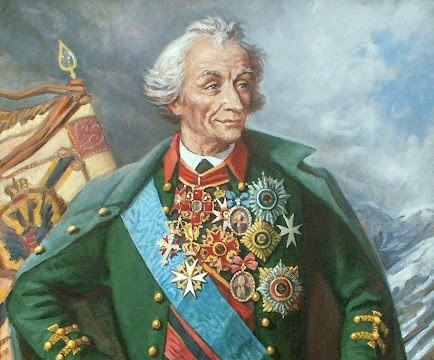Suvorov, the ‘holy generalissimo’ of Russia
Patriarch Kirill is speeding up procedures to achieve the canonisation of the most victorious commander in Russian history by 9 May, the 80th anniversary of Victory. A man who anticipated contemporary directives of ‘hybrid warfare’ in all dimensions, in the field and in politics, in ideology and in religion.
Moscow (AsiaNews) - Patriarch Kirill of Moscow (Gundjaev) is speeding up procedures to obtain tthe canonisation of the ‘generalissimo’ Aleksandr Suvorov, by the fateful date of May 9, the 80th anniversary of Victory in the Great Patriotic War.
Considered the most victorious commander in all of Russian history, Suvorov left behind not only the splendour of military glory, but also a tragic trail of blood all over Europe.
Suvorov's name is linked to the massacres of so many of the empire's minor peoples in the late 18th century, such as the Nogajtsi and Crimean Tatars, Baškiri, Kazakhs and others.
His exaltation is all the more necessary today for the Kremlin, with the resurgence of regional nationalisms in the territories of the Federation, which seek ways to de-colonise from Russia.
The Prince of Suvorov was born in 1729 and died on 6 May 1800, accompanying the expansion policies of Empress Catherine II until the beginning of the militarist reign of her son Paul I.
In 1769, the general started the war against the Barska confederation of Stanislaw Ponjatowski's Poles, who had gathered in Bar Castle on the inspiration of the Catholic bishops, in order to resist the disintegration of the country that occurred in the following years at the hands of the Russians, Prussians and Austrians. Shortly afterwards, he entered the Russo-Turkish War of 1768-1774, Moscow's ‘great revenge’ after the humiliation of defeat in the Crimean War against the European kingdoms.
He also served in Finland and Warsaw, which he conquered in 1794, concluding his glorious career with the Italian campaign in 1799, leading the anti-Napoleonic coalition by triumphantly entering Milan and liberating all of northern Italy from French troops.
His plan was then to conquer all of France, but the Allies forced him to fight in Switzerland, where he showed the last moves of his strategic genius by earning the title of Generalissimus from Emperor Paul I.
Death surprised him three months later, preventing him from stopping the first French attempts to invade Russia, after he had won all the battles in which he had participated.
The great commander received several other high-sounding titles during his lifetime, such as ‘prince of Rymnik’ in the war with the Turks, ‘for the Holy Roman and Russian Empire’, the two Romes of Constantinople and Moscow, or as ‘prince of Sardinia’ after the conquest of Turin and the kingdom of Savoy, also declined as ‘cousin of the king’.
The fact that he frequented Prussian Masonic lodges is today justified by his ‘intellectual curiosity’, without admitting that he was actually a member of Freemasonry.
His 1795 treatise, ‘The Science of Victory’, which is reproposed today as an inspiration for Russian manoeuvres in Ukraine and the training of the people in genuine militant patriotism is considered a ‘sacred text’ of the Russian religion.
It was published in several editions after his death, starting in 1806, and indicated the need to ‘always find the right position’ both in troop deployments and in the motivations of wars, abandoning the simple ‘strategies of cordons and tactical lines’. In this, the prince anticipated all contemporary directives of ‘hybrid warfare’ in all dimensions, in the field and in politics, ideology and religion.
In order to define the heroic virtues of the generalissimo, the synod commission is trying hard to prove the inconsistency of the accusations of genocide of the Circassians and other Caucasian peoples, and of the bloodbath caused in the invasion of Warsaw's Praga district, which was even extolled by the great poet Aleksandr Pushkin.
All Russian historians have lined up in support of the synod procedures, confirming the hagiographic version of historical events that are actually very controversial in unaligned historical studies, even in Russia itself.







.png)










